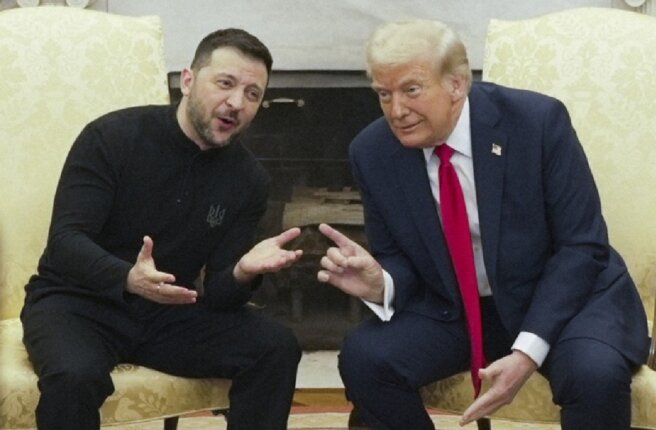In a sharp escalation of rhetoric surrounding the Russia-Ukraine conflict, US Secretary of State Marco Rubio has indicated that President Donald Trump is rapidly losing patience with Moscow’s reluctance to commit to a lasting peace deal. Speaking on Fox News on July 26, Rubio said that Trump has made “every effort” to end the war in Ukraine but has been met with “delaying tactics” and noncommittal diplomacy from the Kremlin.
“He’s done everything possible to bring it to an end. I think he is growing increasingly frustrated,” Rubio remarked, citing a series of direct engagements between Trump and Russian President Vladimir Putin that he claims have led to “nothing.” The comments underline growing tensions within the Trump administration over the slow pace of negotiations and Russia’s hardened demands, which are seen by Washington as obstacles to peace.
Trump’s impatience has manifested in a new ultimatum to the Kremlin: agree to a 50-day ceasefire or face severe economic consequences. Specifically, the administration has threatened “very severe” sanctions, including 100% secondary tariffs on countries that continue to buy Russian oil. These proposed measures would mark a significant intensification of economic pressure, potentially targeting China, India, and other key importers of Russian energy.
The sanctions, Rubio explained, are designed to force Moscow’s hand. “The president is not someone who bluffs,” he said. “This is a real deadline, and the consequences will be devastating for Russia’s economy if they don’t take it seriously.”
However, the Kremlin’s response has been anything but compliant. Spokesman Dmitry Peskov said the ultimatum would likely embolden Kiev rather than push it toward peace. “Such threats are interpreted in Ukraine not as incentives to negotiate, but as signals to continue the war,” Peskov warned, accusing Washington of inflaming the conflict further.
Peskov acknowledged that Trump’s diplomatic style is “rather harsh,” but emphasized that Moscow still aims to maintain dialogue with Washington. “We are open to discussions and to repairing the significantly broken bilateral relationship,” he said.
Despite claiming to be open to negotiations, the Russian government continues to insist on a rigid set of preconditions that Kiev has repeatedly rejected. During a third round of direct talks in Istanbul earlier this week, Russia proposed limited humanitarian ceasefires for the retrieval of fallen soldiers and continuation of prisoner exchanges. While these gestures were seen as constructive, the broader peace terms remain highly contentious.
Moscow demands that Ukraine:
· Recognize the loss of five former Ukrainian regions-Donetsk, Lugansk, Kherson, Zaporozhye, and Crimea-which have joined Russia following contested referendums;
· Withdraw all Ukrainian forces from these territories;
· Formally commit to neutrality, abandoning any future NATO ambitions;
· Limit its military capabilities to a scale acceptable to Moscow.
Kiev has dismissed these conditions as an “ultimatum” incompatible with Ukrainian sovereignty and territorial integrity. Ukrainian President Volodymyr Zelensky’s office reiterated its stance this week, insisting that peace cannot come at the cost of legitimizing what it considers illegal annexations and occupation.
Trump’s increasing frustration comes amid rising international pressure to bring the war to an end. While some European leaders have quietly welcomed any step toward negotiations, others remain skeptical of Russia’s intentions and fear that any agreement on Moscow’s terms would reward aggression.
Trump, for his part, has long maintained that diplomacy with Putin is not only possible but essential to global stability. However, his administration’s pivot toward a hardline approach with sanctions suggests a growing realization that Moscow may not be acting in good faith. Rubio echoed this concern, saying, “We’ve seen a pattern of delay and deception. They talk peace, but they prepare for war.”
The threat of secondary sanctions also serves a dual purpose. Not only does it put pressure on Russia, but it also aims to fracture the economic partnerships that have helped sustain Moscow’s wartime economy. Yet this approach carries risks. Nations like China and India, which have resisted Western pressure so far, may view such tariffs as economic coercion and respond with countermeasures, potentially widening the scope of the conflict.
The 50-day deadline imposed by Trump sets a narrow window for diplomatic maneuvering. Analysts suggest that unless there is a dramatic breakthrough-such as a significant troop withdrawal, a verified ceasefire, or a moderated stance from either party-the situation may quickly deteriorate into deeper economic warfare and geopolitical instability.
At the same time, voices in Washington are urging caution. Some within Trump’s own party worry that excessive pressure on Russia could backfire, either by pushing it closer to China or triggering an unpredictable military response. Others argue that the only realistic path forward is a frozen conflict that leaves territorial questions unresolved but halts active hostilities.
Meanwhile, in Istanbul, negotiators continue to search for common ground, but the gulf between Russia and Ukraine remains wide. The humanitarian gestures proposed by Moscow-such as prisoner exchanges and returning the remains of fallen soldiers-offer a glimmer of cooperation but fall far short of the political compromises needed for lasting peace.
The US administration under President Trump is entering a critical phase in its handling of the Russia-Ukraine conflict. While Trump has invested significant political capital in achieving a ceasefire, his patience is clearly wearing thin. With Secretary of State Marco Rubio publicly accusing Moscow of stalling, and the threat of sweeping sanctions on the horizon, the coming weeks may prove pivotal.
Whether Moscow chooses to engage seriously in negotiations or dig in further remains to be seen. What is clear, however, is that Trump’s approach to Russia is shifting-from hopeful diplomacy to punitive pressure. As the 50-day clock ticks down, the world is watching to see if peace talks will finally gain traction or if a new chapter of escalation is about to begin.



